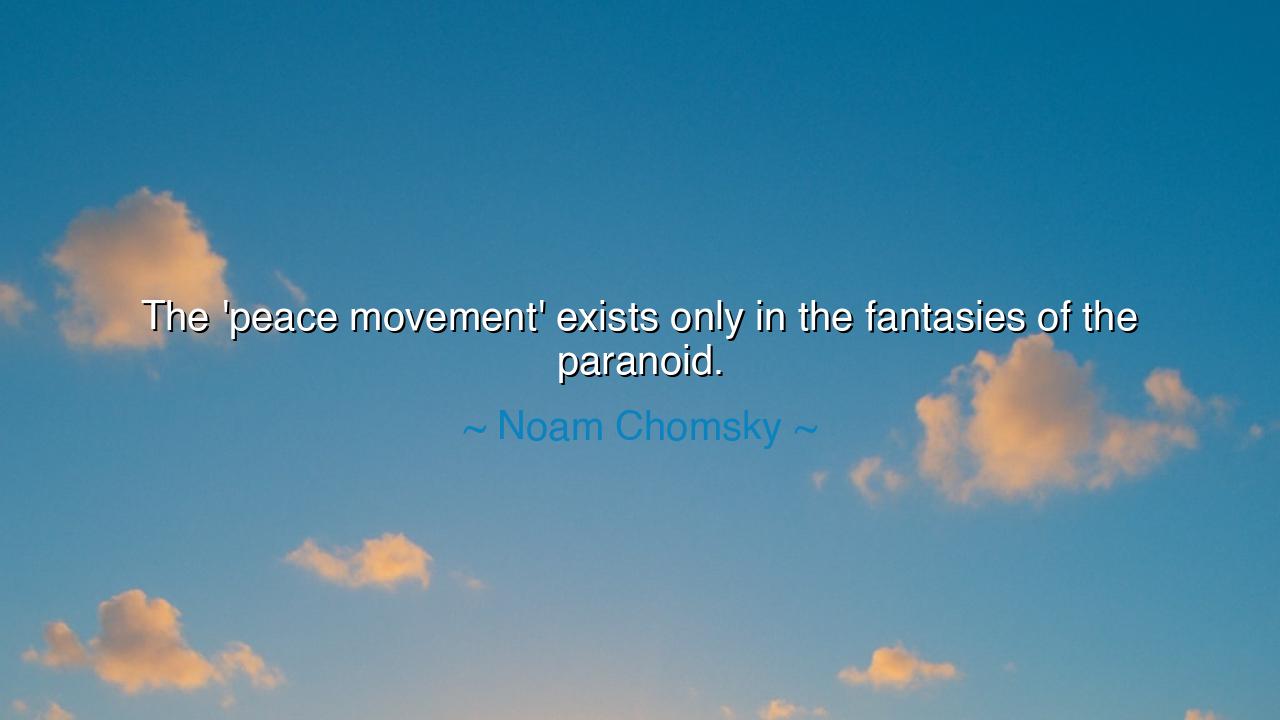
The 'peace movement' exists only in the fantasies of the






The words of Noam Chomsky—“The ‘peace movement’ exists only in the fantasies of the paranoid.”—cut sharply, like the edge of a blade meant not to destroy but to awaken. They remind us that in times of war and conflict, the powerful often conjure phantoms to justify their violence. Those who speak of peace are not always treated as guardians of humanity, but as threats to order, enemies to be feared, and conspirators in some imagined treachery. In Chomsky’s irony, we see the truth: the rulers of nations often invent the idea of a great peace movement as a menace, when in fact it is only the simple cry of ordinary people yearning to live without chains of blood.
The ancients knew well the tactic of casting suspicion upon the innocent. Socrates, in Athens, was accused of corrupting the youth and conspiring against the gods, when in truth he merely questioned the folly of men. Likewise, those who spoke against war were labeled traitors, cowards, or conspirators. Chomsky points to this very pattern: the paranoid in power imagine vast movements threatening their control, when the real desire for peace lives quietly in the hearts of common men and women who are weary of war.
History provides vivid testimony. In the era of the Vietnam War, the United States government spoke of “peace activists” as dangerous radicals, threatening stability, undermining patriotism, even aiding the enemy. Yet most of these so-called radicals were students, clergy, mothers, and veterans, who marched not to destroy their country but to save it from self-destruction. The paranoia of the rulers magnified their voices into monstrous threats, when in truth they sought only to halt the endless slaughter. Here, Chomsky’s words find their living proof.
But his teaching goes deeper still. He shows us that power fears peace as much as it fears rebellion. For war unites nations under banners, justifies vast expenditures, and gives rulers the mantle of authority. Peace, by contrast, removes their excuse for domination, exposes their motives, and restores the strength of the people. Thus the fantasy of a grand “peace movement” serves the rulers well: it allows them to paint love as danger, and to disguise their own hunger for control.
Consider also the example of Martin Luther King Jr. In the final years of his life, when he spoke not only of civil rights but of peace and opposition to the Vietnam War, he was branded as unpatriotic, dangerous, and reckless. The peace he preached was transformed by the fearful into a kind of menace. But history has judged otherwise. His voice, though silenced, became a torch carried forward, proving that the paranoid fantasies of the powerful cannot extinguish the truth of peace when it is spoken from the heart.
The lesson for us is clear: never be deceived when rulers declare peace-seekers to be enemies. Look past their cries of paranoia and ask: who benefits from this fear? Who profits from this war? And who suffers? More often than not, those who seek peace are not conspirators, but prophets of truth. To dismiss them as dangerous is to let the powerful maintain their grip through fear.
Practically, this means standing with the peacemakers, even when the world mocks them. It means questioning the tales of danger spun by those in authority, discerning whether the threat is real or merely imagined. And it means daring to raise your own voice, even if it is small, for peace does not require an army to be born—it begins with the courage of a few, who refuse to be silenced by paranoia.
So let Chomsky’s words echo through your heart: “The ‘peace movement’ exists only in the fantasies of the paranoid.” Remember that the world will always have rulers who invent enemies, even out of those who seek harmony. Yet truth endures: peace is no fantasy, but the quiet and eternal longing of humanity. It will never be erased by suspicion, and it waits always for the brave to claim it.






AAdministratorAdministrator
Welcome, honored guests. Please leave a comment, we will respond soon